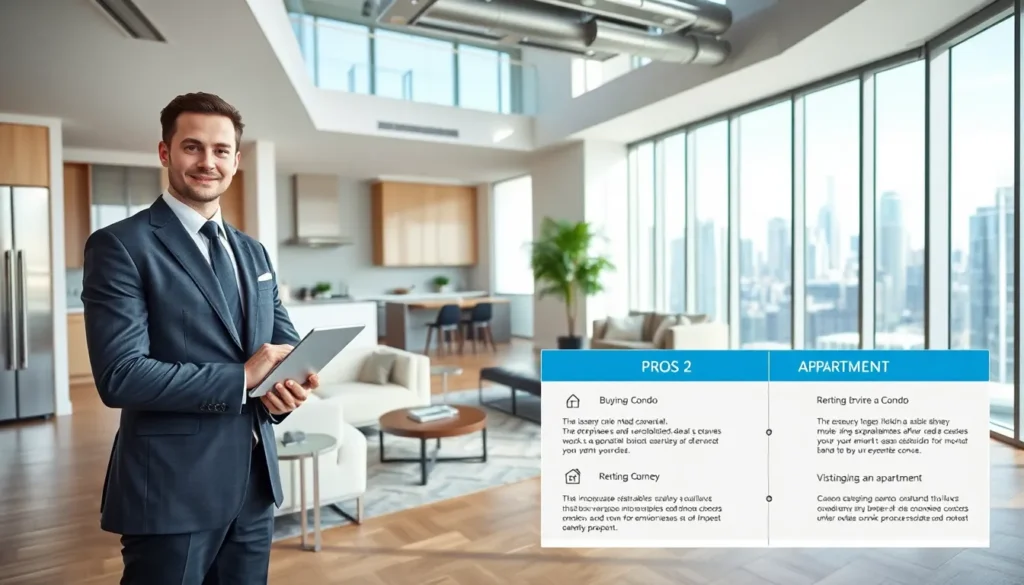Table of Contents
ToggleDeciding between renting and buying a condo can feel like choosing between pizza and tacos, both are great in their own right. While renting often offers more flexibility, buying might feel like the ultimate long-term investment. But what if your pizza gets cold while mulling over this decision? Fear not. This comprehensive guide will walk you through the pros and cons of each option, with a sprinkle of humor to keep things lively. Whether you’re dreaming of customizing your own space or just want to keep your freedom intact, let’s investigate into the condo market and make sense of it all.
Understanding the Condo Market

Before diving into the specifics of renting versus buying, it’s vital to understand the condo market itself. Condominiums have surged in popularity thanks to their combination of affordability and communal amenities, making them a preferred choice for young professionals, empty-nesters, and anyone wanting a low-maintenance lifestyle. But, market conditions can vary widely between locations. Factors such as local demand, economic development, and rental rates can influence the potential return on investment if one decides to buy. By grasping these nuances, individuals can make informed decisions that align with their financial goals.
Advantages of Renting a Condo
Renting a condo has its fair share of perks, making it an appealing option for many:
Financial Flexibility and Lower Upfront Costs
One of the leading reasons renters flock to condos is financial flexibility. Unlike purchasing a property, renting typically requires a minimal deposit, allowing people to allocate more funds towards living expenses or savings. Plus, factors like market fluctuations won’t snag you in a panic.
Maintenance Responsibilities and Freedom
Who doesn’t love the idea of someone else taking care of repairs? With renting, the landlord often shoulders any maintenance responsibilities, sparing tenants from annoying plumbing issues or surprise roof repairs. The freedom to move without worrying about selling your property is another bonus, making life feel less like a trap and more like a journey.
Potential for Short-Term Living Arrangements
Renting opens up a world of possibilities for those who crave adventure or change. Need to relocate for a job? No problem. Want to test out living in a trendy neighborhood before committing? Renting allows that. A short lease can be an attractive perk for those who prioritize flexibility.
Disadvantages of Renting a Condo
Even though its appeal, renting a condo carries some considerable downsides:
Lack of Equity and Investment Potential
Renting can feel like tossing money into a black hole. While some see it as a waste, others believe it buys them freedom. But, without owning property, renters miss out on equity building. That’s money that could appreciate over time, giving homeowners an advantage as the market grows.
Limited Control Over Living Space
Ever dreamed of painting the walls bright green or transforming that boring living room? A renter’s world is often restricted by landlord decisions. Customization options can be limited, leaving some renters feeling like they’re just guests in their own homes, even though paying the bills.
Potential for Rent Increases
Landlords, much like the greedy goblins of legend, may raise rents to keep up with market rates. This potential for rent increases can lead to uncertainty and budget concerns, leaving renters at the whim of market changes.
Advantages of Buying a Condo
On the flip side, buying a condo boasts a range of enticing benefits:
Building Equity and Investing in Real Estate
One of the biggest advantages of buying is the opportunity to build equity. As homeowners pay off their mortgage, they increase ownership stake in the property. Over time, this equity can become a powerful financial asset, especially when the property appreciates.
Greater Control Over Property and Customization
Homeownership opens the door to personal expression. Want to knock down that wall and create an open floor plan? Go for it. Buying a condo not only offers the freedom to customize but also firmness in lifestyle decisions. It can feel incredibly satisfying to truly call a place “home.”
Tax Benefits and Long-Term Stability
In many cases, homeowners can take advantage of tax deductions on mortgage interest, making payments more manageable. Also, owning a condo can provide long-term stability, especially in markets with rising property values.
Disadvantages of Buying a Condo
Yet, like that too-good-to-be-true deal, buying comes with its own set of pitfalls:
High Upfront Costs and Financial Commitment
Buying a condo usually means committing a significant amount towards the down payment. Alongside that hefty check, buyers must consider closing costs, inspections, and potentially expensive renovations. This upfront expense makes homeownership a daunting try.
Ongoing Maintenance and HOA Fees
Welcome to the joys of homeownership. With great power comes great responsibility (and expenses). Buyers are often responsible for maintenance and upkeep, from replacing appliances to landscaping. Also, many condos come with homeowners association (HOA) fees for shared amenities, costs that could strain a budget.
Market Risk and Selling Challenges
Real estate isn’t immune to economic downturns. Homeowners can face challenges when it’s time to sell, especially if the housing market takes a dive. The investment can feel less secure compared to renting, which doesn’t tie one to the property value whims.
Making the Right Choice: Renting or Buying?
Choosing between renting and buying is rarely black and white: it often involves a spectrum of gray. To make the best decision, consider the following:
Evaluating Your Financial Situation and Goals
It’s crucial to take stock of personal finances before making any move. Do you have savings for a down payment, or would it be wiser to rent while building up cash reserves? Individuals should carefully evaluate their financial status to align it with future aspirations.
Considering Lifestyle and Future Plans
A person’s lifestyle greatly impacts their ideal housing situation. Do they prefer stability, or do they thrive on spontaneity? Anyone considering a family soon might have different needs than a young professional on the move. Future plans should play a significant role in the decision-making process.
Assessing Market Conditions and Timing
Condo markets can fluctuate based on demand, location, and economic conditions. Prospective buyers should keep an eye on market trends and consider timing their purchase to secure the best possible deal.




